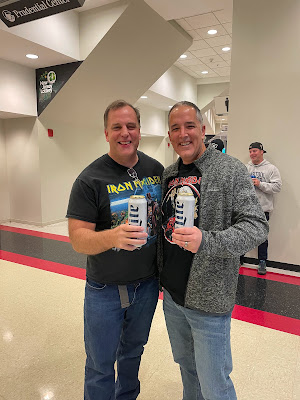 |
| Me and Scott... and 24 oz. Miller Lite |
It strikes me that I haven’t reviewed nor mentioned the recent Iron Maiden show I attended last Friday at the Prudential Center in Newark, NJ. I went with an old buddy of mine, Scott, a dude I brought to his first Maiden show back in 2008.
I first saw Maiden back in 1991 on the No Prayer for the Dying tour, so I was an old hand when I broke Scott’s Maiden cherry 14 years ago. It was great to see Maiden with him again. We may be getting older but we’re still rocking.
What can I properly say about Iron Maiden that hasn’t been already said? Very little. They’re probably the greatest heavy metal band of all time. They are to metal what the Beatles are to pop rock, or Johnny Cash is to country. Fucking legends, full stop.
But I have to say something. So here's a statement.
What makes Maiden special to me is that they don’t compromise. They have integrity. They do what they want, they don’t change with the times, or blow with the winds of fashion. If you don’t like it, tough shit.
Not everyone likes their current direction. Yes, they are writing long songs, and perhaps deserve some criticism for too much repetition.
But I’ve come to accept that it’s what they want to do. They’ve earned the right to do what they want, after 40 years of entertaining us. And frankly, I still like what they are putting out. Not unreservedly, but some of it.
Maiden opened up with three songs off their new album, Senjutsu. That’s probably the kiss of death for many bands. But not these dudes. The crowd was into it. And the third song, “Writing on the Wall,” was met with a roaring reception. “Writing on the Wall” was written pre-COVID-19, but it has an apocalyptic feel, apocalyptic lyrics, and the timing of its release makes it feel like a commentary on the state of the world circa March 2020. It still feels like we’re on the brink of disaster every day, between climate catastrophe, looming nuclear war with Russia, saber-rattling with China, and the general savage in-fighting between Republicans and Democrats, and everyone else on Twitter and Facebook. We’re living in a shit-show and this song captures the Four Horsemen quite well. I love it. Listen below.
I also liked that Maiden played “Sign of the Cross” and “The Clansman,” despite the fact that both of these songs are from the Blaze Bayley era, a time when Maiden was at its lowest ebb. It doesn’t matter; they’re great tunes, and are just awesome in concert. Kudos to Bruce for swallowing his pride and playing songs from an era where he voluntarily left the band. He knows they kick ass.
Again, integrity.
My one criticism? No songs off Somewhere in Time or Seventh Son of a Seventh Son, the two albums where I believe the band hit its creative peak. But, I can’t complain too much. Maiden has begun advertising a 2023 “The Future Past Tour,” which if you see the imagery will feature a heavy dose of SiT. So, I’m OK with it. They still cranked out “Revelations,” “Fear of the Dark,” “Aces High,” “The Trooper,” “Flight of Icarus,” and of course “Hallowed be thy Name” and “Run to the Hills,” among other hits. A great mix of classics and new material. “Blood Brothers” has become a classic from the modern/post Bruce reunion era of Maiden, a pean to the spirit of the brotherhood of men, and of boys and their fathers. Bruce sounded great.
So, there’s Maiden. No compromise. Still kicking ass in 2022. I’m so glad they’re still around when they could be enjoying their retirement years on a beach in Maui.

